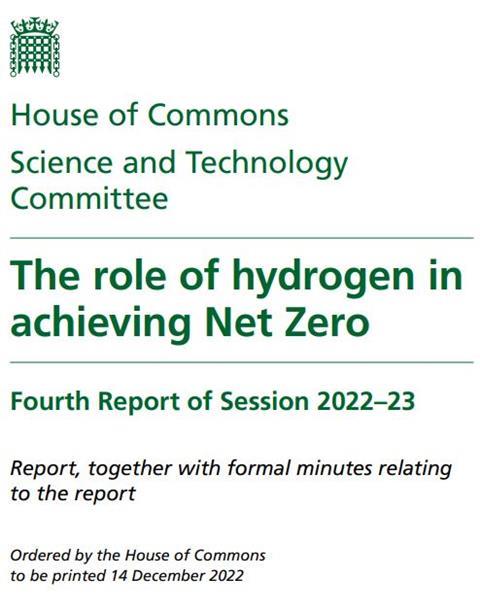A report released by the Science and Technology Select Committee of MPs in the UK, has looked at the role hydrgoen will play in the achieving the UK’s net zero emissions ambitions by 2050, concluding it “is not a panacea”, but can grow to become “a big niche” fuel in particular sectors and applications.

The 85-page report is the result of two years of research and hearings by the committe with many UK fleet operators and freight transport trade bodies giving evidence. For passenger cars, the report concludes hydrogen will have a very small part to play in decarbonising the sector, acknowledging battery technologies have established “a seemingly unassailable lead over other green alternatives”. However, on HGV fuelling, the Select Committee made up of 11 MPs and chaired by Greg Clark, is less decisive inidicating that due to its shorter refuelling times and longer ranges, hydrogen offers a potentially viable alternative to electrification for HGVs. The report adds “widespread adoption of hydrogen in HGVs can only be achieved with an assurance that hydrogen will be widely available across the country. Whilst other countries have given commitments to hydrogen refuelling stations, the UK has been more reticent to date”.
In conclusion, the report calls for ”more trials for heavy goods vehicles, beyond those already announced and forthcoming as part of the Zero Emission Road Freight demonstration programme” and these trials ”need to take place in the next five years to ensure that a firm decision can be made on the role of hydrogen in HGVs in time to develop the infrastructure needed to deliver carbon emission reductions. Trials could be localised to minimise the initial infrastructure requirements. Any early adoption of hydrogen HGVs is likely to require subsidy by the Government to overcome the higher cost for the operators”.
Commenting on the report, Andy Eastlake, Chief Executive at Zemo Partnership, the public-private partnership working to accelerate transport to zero emissions, said: “ The Committee has tackled this issue robustly and, I think, accurately reflected the challenges and opportunities for hydrogen in transport. We welcome the call to strengthen the evidence-base with accelerated, independent trials enabling rapid decision making on the potential viability of hydrogen as a fuel for HGVs. We also endorse the calls for international collaboration and evidence-gathering, particularly with reference to HGVs, and would add that there should also be specific consideration given to non-road mobile machinery (NRMM). The Committee is right to identify buses as having potential for the use of hydrogen in certain situations and the need for accelerated trials to identify the opportunities that could exist.”













